牛顿介绍 英文
介绍牛顿的一生英语作文
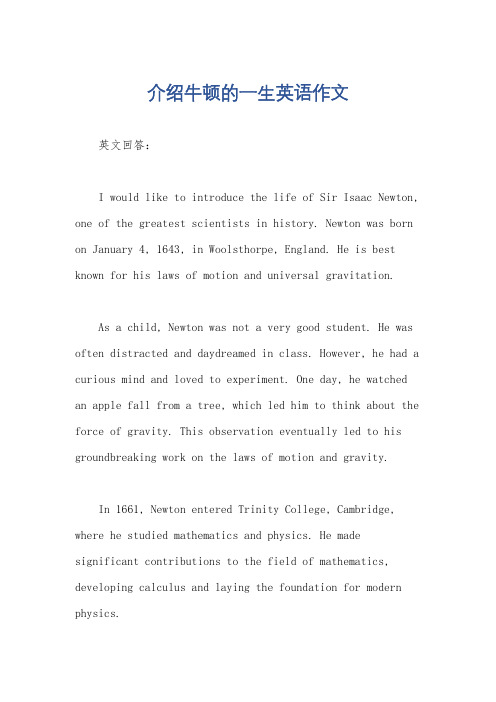
介绍牛顿的一生英语作文英文回答:I would like to introduce the life of Sir Isaac Newton, one of the greatest scientists in history. Newton was born on January 4, 1643, in Woolsthorpe, England. He is best known for his laws of motion and universal gravitation.As a child, Newton was not a very good student. He was often distracted and daydreamed in class. However, he had a curious mind and loved to experiment. One day, he watched an apple fall from a tree, which led him to think about the force of gravity. This observation eventually led to his groundbreaking work on the laws of motion and gravity.In 1661, Newton entered Trinity College, Cambridge, where he studied mathematics and physics. He made significant contributions to the field of mathematics, developing calculus and laying the foundation for modern physics.One of Newton's most famous works is his book "Philosophiæ Naturalis Principia Mathematica," where he outlined his laws of motion and universal gravitation. These laws revolutionized the way we understand the physical world and are still used today in physics and engineering.Despite his genius, Newton was known to be a reclusive and eccentric man. He had a fierce temper and often clashed with his colleagues. However, his contributions to science are undeniable, and he is considered one of the most influential scientists of all time.中文回答:我想介绍一下艾萨克·牛顿爵士的一生,他是历史上最伟大的科学家之一。
牛顿的英文作文介绍

牛顿的英文作文介绍英文:Newton was one of the most influential scientists in history. He was born in 1642 in England and is best knownfor his laws of motion and his work on gravity. His laws of motion describe how objects move and interact with each other, while his work on gravity explains why objects are attracted to each other.One of the most famous stories about Newton is the one about the apple falling on his head. According to the story, Newton was sitting under an apple tree when an apple fellon his head. This event led him to wonder why the applefell straight down instead of sideways or up. This led himto develop his theory of gravity.Another important contribution that Newton made to science was his work on light. He discovered that whitelight is made up of different colors and that each colorhas a different wavelength. This led to the development of the first color wheel.In addition to his scientific work, Newton was also a mathematician. He developed calculus, which is a branch of mathematics that deals with rates of change and slopes of curves. Calculus is used in many fields today, including physics, engineering, and economics.Overall, Newton's contributions to science and mathematics have had a profound impact on our understanding of the world around us. His ideas and discoveries continueto influence scientists and researchers today.中文:牛顿是历史上最具影响力的科学家之一。
介绍牛顿1分钟英文作文

介绍牛顿1分钟英文作文Isaac Newton was a renowned English mathematician, physicist, astronomer, and natural philosopher who lived during the 17th century. His contributions to the scientific revolution are considered among the most significant in the history of science. In this essay, we will explore the life and achievements of this remarkable individual.Born on January 4, 1642, in Woolsthorpe Manor, Lincolnshire, England, Newton grew up in a time of great intellectual and scientific advancements. As a young boy, he exhibited a keen interest in the natural world, often tinkering with mechanical devices and conducting experiments. His curiosity and analytical mind would later become the driving force behind his groundbreaking discoveries.One of Newton's most famous contributions was his formulation of the three laws of motion, which laid the foundation for classical mechanics. The first law, also known as the law of inertia, states that an object at rest will remain at rest, and an object in motion will continue to move at a constant velocity unless acted upon by an external force. The second law, which relates the acceleration of an object to the net force acting upon it, is often expressed as theequation F = ma, where F represents the force, m is the mass of the object, and a is the acceleration. The third law, often referred to as the action-reaction law, states that for every action, there is an equal and opposite reaction.In addition to his work on mechanics, Newton made significant contributions to the field of optics. He conducted extensive experiments with light, leading to the development of the reflecting telescope and the understanding of the nature of white light. Newton's work on the spectrum of light and the properties of prisms laid the groundwork for the study of color and the wave-particle duality of light.Another major achievement of Newton was his work in the field of mathematics. He is credited with the development of calculus, a branch of mathematics that deals with the study of rates of change and the accumulation of quantities. Newton's work on calculus, which he developed independently from Gottfried Leibniz, revolutionized the way scientists and mathematicians approached problems involving motion, change, and the behavior of continuous systems.Newton's scientific contributions were not limited to the fields of mechanics, optics, and mathematics. He also made significant advances in the understanding of gravity and the motion of celestialbodies. His law of universal gravitation, which states that every particle in the universe attracts every other particle with a force that is directly proportional to the product of their masses and inversely proportional to the square of the distance between them, provided a unified explanation for the motion of the planets, the tides, and the behavior of falling objects on Earth.Despite his many accomplishments, Newton's life was not without its challenges. He faced periods of poor health, personal struggles, and conflicts with other scientists over the priority of various discoveries. However, his unwavering dedication to his work and his insatiable curiosity kept him driven to push the boundaries of human knowledge.In the later years of his life, Newton held various prestigious positions, including serving as the Master of the Royal Mint and being elected as a member of the Parliament of England. He was also knighted by Queen Anne in 1705, a recognition of his immense contributions to the scientific community.Newton's legacy continues to be felt in the modern world, as his theories and discoveries form the foundation of much of our understanding of the physical universe. His work has inspired countless scientists, engineers, and thinkers, and his influence can be seen in fields ranging from astronomy and physics to economics andcomputer science.In conclusion, Isaac Newton was a true giant of science, whose contributions have had a profound and lasting impact on our understanding of the natural world. His unwavering dedication to the pursuit of knowledge and his ability to make groundbreaking discoveries have cemented his place as one of the most influential figures in the history of science.。
介绍牛顿的英文作文带翻译

介绍牛顿的英文作文带翻译英文:As one of the most influential scientists in history,Sir Isaac Newton made significant contributions to thefields of physics, mathematics, and astronomy. Born in 1643 in England, Newton's groundbreaking work laid thefoundation for many scientific principles that are still used today.One of Newton's most famous contributions is his three laws of motion. These laws describe the relationship between the motion of an object and the forces acting on it. For example, his first law states that an object at restwill remain at rest, and an object in motion will remain in motion unless acted upon by an external force. This concept is commonly known as "Newton's first law" and is often illustrated using the example of a ball rolling on a flat surface.Another key concept introduced by Newton is the law of universal gravitation, which explains the force of gravity between two objects. This law states that every particle of matter in the universe attracts every other particle with a force that is directly proportional to the product of their masses and inversely proportional to the square of the distance between their centers. This principle is often summarized by the famous phrase "what goes up, must come down," reflecting the idea that all objects are subject to the force of gravity.In addition to his scientific discoveries, Newton also made significant contributions to the field of mathematics. He is credited with developing calculus, a branch of mathematics that deals with rates of change and accumulation. His work in this area has had a profound impact on fields such as engineering, physics, and economics.Newton's legacy continues to influence scientific research and education to this day. His laws of motion and the law of universal gravitation are fundamental principlesin the study of physics, and his contributions to mathematics have paved the way for countless advancements in the field.中文:作为历史上最有影响力的科学家之一,艾萨克·牛顿爵士对物理学、数学和天文学领域做出了重大贡献。
介绍牛顿的一生英语作文
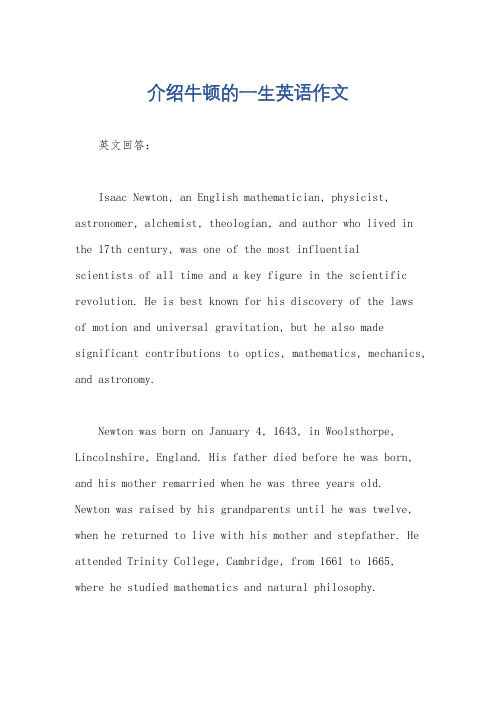
介绍牛顿的一生英语作文英文回答:Isaac Newton, an English mathematician, physicist, astronomer, alchemist, theologian, and author who lived in the 17th century, was one of the most influentialscientists of all time and a key figure in the scientific revolution. He is best known for his discovery of the lawsof motion and universal gravitation, but he also made significant contributions to optics, mathematics, mechanics, and astronomy.Newton was born on January 4, 1643, in Woolsthorpe, Lincolnshire, England. His father died before he was born, and his mother remarried when he was three years old. Newton was raised by his grandparents until he was twelve, when he returned to live with his mother and stepfather. He attended Trinity College, Cambridge, from 1661 to 1665, where he studied mathematics and natural philosophy.In 1665, the Great Plague of London forced Newton to return home to Woolsthorpe. During this time, he developed his theory of calculus, which he called "the method of fluxions." He also made significant progress on his theory of universal gravitation, which he published in his Principia Mathematica in 1687.In 1669, Newton was appointed Lucasian Professor of Mathematics at Cambridge. He held this position until 1701, when he was appointed Master of the Royal Mint. He served in this role until his death in 1727.Newton was a prolific writer, and his works include the Principia Mathematica, the Opticks, and the Method of Fluxions. He was also a devout Christian, and he wrote extensively on religious topics.Newton died on March 20, 1727, in London. He was buried in Westminster Abbey.中文回答:艾萨克·牛顿,是一位生活在17世纪的英国数学家、物理学家、天文学家、炼金术士、神学家和作家,他是当时最具影响力的科学家之一,也是科学革命的关键人物。
英语牛顿传记小作文

英语牛顿传记小作文英文回答:Sir Isaac Newton, an English mathematician, physicist, astronomer, alchemist, theologian, and author who lived from 1642 to 1727, is widely recognized as one of the most influential scientists of all time and a key figure in the scientific revolution. He is best known for his discovery of the laws of motion and universal gravitation, which laid the foundation for classical mechanics. Newton's work also had a profound impact on the fields of mathematics, optics, and astronomy.Born in Woolsthorpe, Lincolnshire, Newton was a precocious child who showed an early aptitude for mathematics and science. He attended Trinity College, Cambridge, where he studied under Isaac Barrow. In 1665, during the Great Plague of London, Newton returned to Woolsthorpe, where he made some of his most important discoveries. It was during this period that he developedhis theory of calculus, investigated the laws of motion, and formulated his law of universal gravitation.In 1687, Newton published his seminal work, "Principia Mathematica," which revolutionized the understanding of the laws of motion and gravity. The book presented Newton's three laws of motion and his law of universal gravitation, providing a comprehensive framework for understanding the behavior of physical objects. "Principia Mathematica" had a profound influence on the development of physics and astronomy, and it remains a cornerstone of classical mechanics to this day.Newton's contributions to mathematics were also significant. He developed a method of calculus that allowed mathematicians to solve complex problems involving continuous change. He also made important contributions to the study of optics, including the discovery of the composition of white light and the development of the reflecting telescope.Newton's work extended beyond the realm of science. Hewas a devout Christian and wrote extensively on religious topics. His theological writings explored the relationship between science and religion, arguing that the laws of nature were evidence of God's design.Newton's legacy continues to inspire scientists, mathematicians, and scholars today. His work laid the foundation for much of modern science, and his discoveries have had a profound impact on our understanding of the universe. He is widely regarded as one of the greatest scientists of all time, and his contributions to scienceand mathematics have shaped the world in which we live.中文回答:艾萨克·牛顿爵士(Sir Isaac Newton)是一位英国数学家、物理学家、天文学家、炼金术士、神学家和作家,他生活在 1642年至 1727 年间,被广泛认为是有史以来最有影响力的科学家之一,也是科学革命中的关键人物。
牛顿简介【英文】

By: Perri Tucker
Who is Sir Isaac Newton??
Isaac Newton was born on December 25,1642. He was an English mathematician and Physicist who invented calculus In 1665 he found the answer to the binomial theorem, that mathematicians had struggled to solve for years. Newton identified the force as gravity and determined its mathematical nature.
Newton’s Law of Gravitation Equation
F=Gm1m2/r2
Newton’s Three Laws of Motion
1) An object at rest stays at rest, and an object in uniform motion remains in that state of motion unless an external force is applied to it. (Law of Inertia)
Newton’s Three Laws of Motion
2) A force causes acceleration of an object. (F=ma)
Newton’s Three Laws of Motion
3) For every action there is an equal and opposite reaction.
牛顿的简介作文英文

牛顿的简介作文英文Isaac Newton was a famous scientist and mathematician. He was born in 1642 in England and is best known for his work on the laws of motion and universal gravitation. Newton's work laid the foundation for classical mechanics and his book "Philosophiæ Naturalis Principia Mathematica" is one of the most influential books in the history of science.Newton made several important discoveries during his lifetime. He developed the three laws of motion, which describe the relationship between a body and the forces acting on it. He also formulated the law of universal gravitation, which states that every particle of matter in the universe attracts every other particle with a forcethat is directly proportional to the product of their masses and inversely proportional to the square of the distance between their centers.In addition to his work in physics, Newton also madesignificant contributions to mathematics. He is creditedwith the development of calculus, along with German mathematician Gottfried Wilhelm Leibniz. Newton's work in mathematics and physics revolutionized the way weunderstand the natural world and laid the groundwork for many future scientific discoveries.Newton's impact on the scientific community was immense, and his work continues to influence scientists and mathematicians to this day. He was knighted by Queen Annein 1705 and spent the later years of his life as the president of the Royal Society, where he continued to make important contributions to scientific research and scholarship.Newton's legacy is one of innovation and discovery. His work in physics and mathematics has had a lasting impact on the way we understand the natural world, and his ideas continue to be studied and celebrated by scientists and scholars around the world. Isaac Newton will always be remembered as one of the greatest scientific minds in history.。
Newton_牛顿_英文介绍
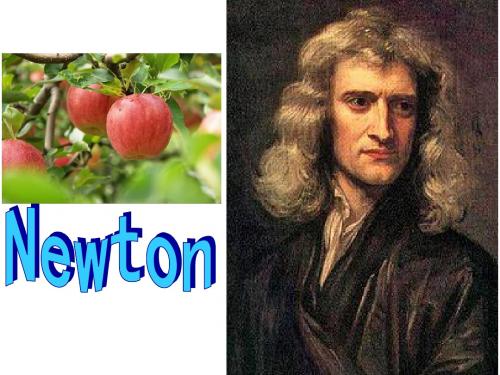
The legend is that Newton saw an apple fall in his garden in Lincolnshire, thought of it in terms of an attractive gravitational force towards the earth, and realized the same force might extend as far as the moon.
And so on .
1、the discovery of gravitational theory and classic mechanics
Let us now turn to the central topic f the Principia, the universality of the gravitational force.
The main experiences of newton
he entered Cambridge University in 1661;
he was elected a Fellow of Trinity College in 1667, and got the Master's Degree the next year.
The main contributions of Newton
1、The invention of calculus
2、the discovery of gravitational theory and classic mechanics
3、Optics ①、the designer an the inventor of the first type of catoptric telescope ②、discovered the princinple of optical dispersion
牛顿的简介作文英文

牛顿的简介作文英文英文:Newton, one of the most famous scientists in history, was born in 1642 in England. He is known for his contributions to physics, mathematics, and astronomy. He developed the laws of motion and universal gravitation, which revolutionized our understanding of the natural world.As a child, Newton was not particularly interested in academics. However, he was fascinated by mechanics andspent much of his time building machines and experimenting with them. Later, he attended Trinity College at the University of Cambridge, where he studied mathematics and became interested in the works of Galileo and Descartes.In 1687, Newton published his most famous work, "Mathematical Principles of Natural Philosophy," which laid out his laws of motion and universal gravitation. Theselaws explained how objects move and interact with eachother in the universe, and they have been used to make countless scientific discoveries since then.One of the most famous stories about Newton is thestory of the apple falling on his head, which supposedly inspired him to discover the laws of gravity. While this story may be apocryphal, it is true that Newton wasinspired by observing the natural world and trying to understand its workings.Overall, Newton's contributions to science have been immeasurable. His work laid the foundation for modern physics and helped us to understand the universe in a way that was previously unimaginable.中文:牛顿是历史上最著名的科学家之一,于1642年出生在英格兰。
牛顿英文简介

牛顿英文简介艾萨克牛顿,英国出名的物理学家,百科全书式的“全才”,下面是我给大家整理的牛顿英文简介,供大家参阅!艾萨克牛顿人物生平TeenagerOn January 4, 1643, Isaac Newton was born in the Woolsthorpe manor in a small village of Woolthorpe village in Lincolnshire, England. At the time of Newtons birth, England did not use the Popes latest calendar, so his birthday was recorded as Christmas in 1642. Newton was born three months before, he also named Isaacs father had just died. It was rumored that his mother, Hannah Ayscough, had said that Newton was born when he was small enough to put him in a quart of mugs. When Newton was three years old, his mother remarried and housed the home of the new husband Barnabus Smith, and entrusted Newton to his grandmother Margery Ayscough, The Young Newton did not like his stepfather and had some hostility to his mother because of his mother s remarriage, and Newton had even written: threaten my stepfather and mother, and burn them together with the house.In 1648, Newton was sent to study. Junior Newton is not a child prodigy, his performance in general, but he likes to read, like to see some of the simple mechanical model production methods of reading, and inspired by their own hands to create some strange gadgets, such as windmills, Wooden bell, folding lanterns and so on.The legend of Newton touched the mechanical principle of the windmill, made a model of the mill, he tied the mouse to a wheeled treadmill, and then put a corn in front of the wheel, just that place is The mouse is inaccessible position. The mouse would like to eat corn, and constantly running, so the wheels kept turning; once again when he was flying a kite, hanging on the rope with a small light, the night the village looked surprised to see the comet appeared; he also made a small bell The Every morning, a small water clock will automatically drip into his face, urging him to get up. He also likes painting, sculpture, especially like carved sundials, home walls, windowsill everywhere placed with his portrayed sundial, to see the shadow of the move.school daysIn 1654, Newton went out of school with more than a dozen kilometers of Kowloons Kings Royal High School. Newtons mother had hoped that he would become a farmer, but Newton himself did not intend to, and love reading. With the increase in age, Newton more love to study, like meditation, do little science experiment. When he was studying at the Royal High School in Kingdez, he had been in a pharmacists home and had been influenced by chemical tests.Newton has a great academic record in the middle school, loves to study, curious about natural phenomena, such as color, shadows, especially geometric, Copernicus, and so on. He also categorized notes, and liked to ingeniously do small tools, tips, small inventions, small tests.At that time the British society infiltrated the new ideas of Christianity, Newton home with two priests as a professional relatives, which may be Newtons religious lifesuffered. Only from these ordinary environment and activities, but also do not see the young Newton is a different from ordinary people can be different children.Later forced to live difficulties, the mother to Newton suspended in the house farming, support the family. But Newton had the opportunity to bury the book, and even forget to work. Every time the mother told him to join the servant with the servant, familiar with the business of doing business, he pleaded with the servant a person took to the streets, he hid in the grove after reading. Once again, Newtons uncle was suspicious, and he followed Newton on the town and found his nephew Newton stretched out his legs, lying on the grass, and concentrating on a math problem. Newtons eager mind touched the uncle, so uncle to persuade his mother to Newton school, and encouraged Newton to college. Newton returned to school again, eager to learn the nutrition of the book.According to the Men of Mathematics, ET Bell and An introduction to the history of mathematics, H. Eves Newton started school education in rural schools and was later sent to the King Middle School of Grantham and became the best student of the school. At Kings High School, he boarded the local pharmacist William (William Clarke), and at the age of 19 went to Cambridge University before the school, with the pharmacists stepfather Anne Stowler (Anne Storer) engagement. Later, because Newton focused on his research and make love cooling, Stole It is said that Newton had a good memory of the affair, but then there was no other romance, and Newton did not marry for life.However, according to the description of the book Memoirs of Sir Isaac NewtonsLife by William Stukeley, a friend of Newtons contemporary era, Strickley died after Newtons death Had visited Vincent (Madame Vincent), that is, Newtons lovers Miss Stole. The name of Mrs. Vincent is called Catherine, not Anne, Anne is her sister (see Arthur Storer), and the lady only said that Newton was the same time she waspregnant with the degree of only.From the age of 12 to 17 years old, Newton in the Royal High School in the study of gold, in the school library windowsill can also see his signature of the year. Hedropped out of school and returned to Elsopau in October 1659 because his widowed mother wanted Newton as a farmer. Newton, though obeying the mother, butaccording to Newtons peers later, the farming work made Newton quite unhappy.Henry Stokes, the principal of the Royal High School of King Kong, persuadedNewtons mother, who was sent back to school to finish his studies. He completed his studies at the age of 18 and got a perfect graduation report.June 3, 1661, he entered the Cambridge University Trinity College. At that time, the colleges teaching was based on Aristotles doctrine, but Newton preferred to read some of the modern philosophers such as Descartes and astronomers such as Galileo, Copernicus and Kepler. In 1665, he discovered the generalized binomial theorem and began to develop a new mathematical theory, that is, later known to the world of calculus. In 1665, Newton got a degree, and the university was shut down to prevent the Great Plague in London. Over the next two years, Newton continues to studycalculus, optics, and gravitational law at home.Political career2/ 4In 1669, was granted to Lucas Professor of Mathematics.In 1689 he was elected a member of Congress. Newton was a member of the Royal Academy of Sciences from 1689 to 1690 and 1701 and became president of the Royal Society in 1703 and worked for 24 years, after Joseph Becks, who was also president of the French Academy of Sciences Of the members.In 1696, Newton passed the administration of the then Chancellor of the Exchequer Charles Montague to move to London for the supervision of the Royal Mint, until death. He presided over the UKs largest money recast, the job is generally idle, but Newton is very serious treatment. As the chief executive of the Royal Mint, Newton estimates that about 20% of the coins are forged. It is very difficult to convict those infamous criminals; but it is proved that Newton is doing well. Newton became a gentleman.In 1705, Newton was called the Queen by Anne Queen.Newton wrote a lot of religious pamphlets that dealt with the text of the Bible in the 1670s. Henry Moores cosmic belief and refusal of Cartesian dualism influenced Newtons religious beliefs. In his never-published manuscript to John Locke, he disputed the existence of the Trinity.ResignationMarch 31, 1727 (Granville), the great Isaac Newton died, and many outstanding British people were buried in the Westminster Abbey. His tombstone engraved: Let people cheer such a great human glory has existed in the world.When the New Year in 1727, 85 years old died, the British buried him in Westminster. Westminsters predecessor is a monastery, in 1579, the British Queen Elizabeth I will Westminster to college, the principal appointed by the British monarch. Westminsters official name was changed to Westminster St. Peters College Church, after three centuries, Westminster became Oxford and Cambridge after the third British institutions of higher learning. The poet Alexander Pope wrote the following epitaph for Newton: Nature and Nature law lay hid in night; God said, Let Newton be, and all was light. The laws of nature and nature are hidden in the darkness; God says, Let Newton come! So everything turned bright.For more than nine hundred years, Westminster Abbey was an important place for the British celebration, except for worship, prayer and worship. British celebrities can be buried after death to this glory. According to statistics, the area covers an area of 2972 square meters of Westminster Temple (Westminster St. Peters College Church), buried a total of more than 3,300 people, including many contemporary celebrities, such as: Darwin, Dickens , Newton, Churchill ... ... countless people in the UK have far-reaching impact on the historical figures are resting in the Westminster Temple, there are many celebrities, itself is not buried here, there are written on the name of the stone plate embedded in the ground as a memorial. And the most famous inside is Newton, he is the first in the history of mankind to get the natural sciences of natural scientists.His cemetery is located in the center of the front hall of Westminster Abbey, that is, the nave, where the statue of a Newton statue stands above the cemetery, and the stone is sitting on a pile of books. There are two angels around, there is a huge earthshape to commemorate his achievements in science.No matter how many Newtons mysteries and controversies, but this is not enough to reduce Newtons influence. In 1726, Voltaire once said that Newton was the greatest man because he ruled our minds with the power of truth, rather than enslave us with force.In fact, if you look at the index of a science encyclopedia, you will find that Newton and his laws and found more than two to three times more than any scientist. Leibniz is not Newtons friend, and there have been very intense debates between them. But he wrote: From the beginning of the world to the time of Newtons life, the contribution to the development of mathematics is largely made by Newton. The great French scientist Laplace wrote: The principle is human wisdom The most outstanding masterpiece of the product. Lagrange often said Newton was the greatest genius ever.In the American scholar Mike Harts 100 people who affect the history of human history list, Newton ranked No. 2, second only to Muhammad. The book pointed out: in Newton after the birth of hundreds of years, peoples lifestyles found earth-shaking changes, and these changes are mostly based on Newtons theory and discovery. In the past 500 years, with the rise of modern science, most peoples daily life has undergone a revolutionary change. Compared with 1500 years ago, we wear different, different diet, work different, but also with them is that we have a lot of leisure time. Scientific discovery not only brings technological and economic revolution, it also completely changed the political, religious thought, art and philosophy.In 2021, the British Broadcasting Corporation was named one of the greatest British people in a global selection of the greatest British activities. The global public is aware that Newtons achievements are cosmopolitan and have an impact on all mankind, said Tristram Hunt, a historian who specializes in editing Newtons album in the Great British family documentary. These voters apparently crossed the borders, and he was happy with Newton s presence.牛顿英文简介相关4/ 4。
介绍牛顿的英语作文
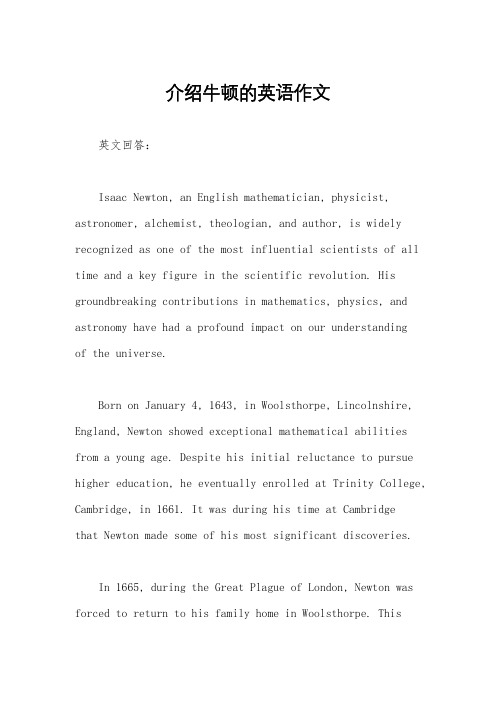
介绍牛顿的英语作文英文回答:Isaac Newton, an English mathematician, physicist, astronomer, alchemist, theologian, and author, is widely recognized as one of the most influential scientists of all time and a key figure in the scientific revolution. His groundbreaking contributions in mathematics, physics, and astronomy have had a profound impact on our understandingof the universe.Born on January 4, 1643, in Woolsthorpe, Lincolnshire, England, Newton showed exceptional mathematical abilities from a young age. Despite his initial reluctance to pursue higher education, he eventually enrolled at Trinity College, Cambridge, in 1661. It was during his time at Cambridgethat Newton made some of his most significant discoveries.In 1665, during the Great Plague of London, Newton was forced to return to his family home in Woolsthorpe. Thisperiod of isolation proved to be highly productive for Newton, and it was during this time that he developed his fundamental laws of motion and universal gravitation. These groundbreaking theories laid the foundation for classical mechanics and celestial mechanics, and they continue to be essential components of modern physics.After returning to Cambridge in 1667, Newton published his seminal work "Philosophiæ Naturalis Principia Mathematica" (Mathematical Principles of Natural Philosophy) in 1687. This masterpiece presented his three laws ofmotion and his law of universal gravitation, whichexplained the motion of celestial bodies and provided a unified framework for understanding the physical world.Newton's contributions to mathematics were equally significant. He developed the calculus, a powerful mathematical tool that revolutionized the fields of mathematics and physics. He also made importantcontributions to the study of optics, including his discovery of the composition of white light and the development of the reflecting telescope.Besides his scientific achievements, Newton was also deeply interested in theology and alchemy. He wrote extensively on biblical interpretation and the existence of God. Newton's religious beliefs influenced his scientific work, and he saw his discoveries as evidence of the harmony and order of the universe.Throughout his life, Newton received numerous honors and accolades for his scientific contributions. He was knighted by Queen Anne in 1705 and served as President of the Royal Society from 1703 to 1727.Isaac Newton's legacy is immense. His groundbreaking discoveries in mathematics, physics, and astronomy laid the foundation for modern science, and his ideas continue to inspire and challenge scientists to this day. His name remains synonymous with scientific genius and his contributions to the advancement of human knowledge are immeasurable.中文回答:牛顿简介。
牛顿英文简介

Universality of gravity
Байду номын сангаас
In 1687, returned back to work on Mechanics. What makes an apple falls down, is responsible for keeping the moon in orbit. The moon is always falling toward Earth. The moon moves forward in space, at the same time. It constantly, misses the Earth.
Reflection Telescope
In 1668, he was able to produce the first reflecting telescope. It is known as Newtonian Telescope. It has many advantages compared to the refracting telescope.
Newton’s
nd 2
Law
the acceleration of an object is directly proportional to the net force acting on it and inversely proportional to its mass.
Newton’s
Bio
n April 1705, Queen Anne knighted Newton during a royal visit to Trinity College, Cambridge. 1717, Newton moved the Pound Sterling de facto from the silver standard to the gold standard. Newton died in his sleep in London on 31 March 1727. After his death, Newton's body was discovered to have had massive amounts of mercury in it. Mercury poisoning could explain Newton's eccentricity in late life.
牛顿的生平及成就英文简介
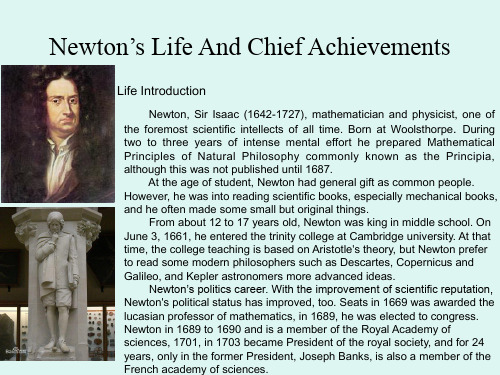
Life Introduction
Newton, Sir Isaac (1642-1727), mathematician and physicist, one of the foremost scientific intellects of all time. Born at Woolsthorpe. During two to three years of intense mental effort he prepared Mathematical Principles of Natural Philosophy commonly known as the Principia, although this was not published until 1687. At the age of student, Newton had general gift as common people. However, he was into reading scientific books, especially mechanical books, and he often made some small but original things. From about 12 to 17 years old, Newton was king in middle school. On June 3, 1661, he entered the trinity college at Cambridge university. At that time, the college teaching is based on Aristotle's theory, but Newton prefer to read some modern philosophers such as Descartes, Copernicus and Galileo, and Kepler astronomers more advanced ideas. Newton’s politics career. With the improvement of scientific reputation, Newton's political status has improved, too. Seats in 1669 was awarded the lucasian professor of mathematics, in 1689, he was elected to congress. Newton in 1689 to 1690 and is a member of the Royal Academy of sciences, 1701, in 1703 became President of the royal society, and for 24 years, only in the former President, Joseph Banks, is also a member of the French academy of sciences.
牛顿身世介绍英文作文简短
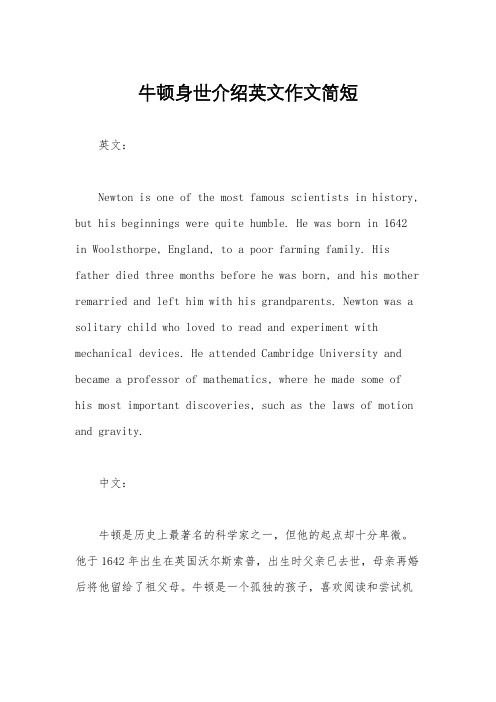
牛顿身世介绍英文作文简短
英文:
Newton is one of the most famous scientists in history, but his beginnings were quite humble. He was born in 1642
in Woolsthorpe, England, to a poor farming family. His father died three months before he was born, and his mother remarried and left him with his grandparents. Newton was a solitary child who loved to read and experiment with mechanical devices. He attended Cambridge University and became a professor of mathematics, where he made some of his most important discoveries, such as the laws of motion and gravity.
中文:
牛顿是历史上最著名的科学家之一,但他的起点却十分卑微。
他于1642年出生在英国沃尔斯索普,出生时父亲已去世,母亲再婚后将他留给了祖父母。
牛顿是一个孤独的孩子,喜欢阅读和尝试机
械装置的实验。
他就读于剑桥大学,并成为了一名数学教授,在那里他做出了一些他最重要的发现,如运动和重力定律。
牛顿介绍_英文
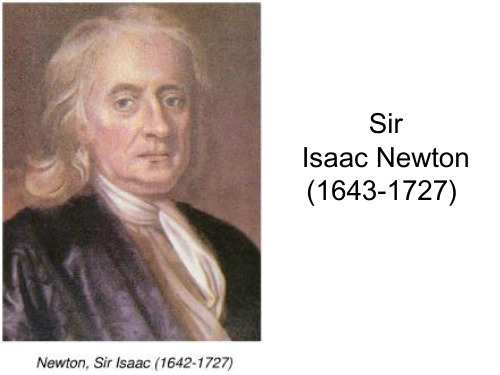
Sir Isaac Newton (1643-1727)
• One day, Newton was reading under an apple tree.
• Suddenly, an apple fell down.
• Newton was born in1643. He grew up in the English countryside. • From the very first Newton was very much interested in the mysteries of nature. • One of the most difficult scientific problems of Newton's day was about the question of motion. Why did objects move?.
• Newton was the greatest mathematician and physicist in the world.
• When did Newton born? • Where did Newton from? • Which university did he in?
He thought, -Why the apple fell down? -Whether anything will also fall down or not? - Will the sun, the moon and stars fall down, too? After a lot of experiments, Newton finally found the Law of w the story of Newton and the falling apple. • But do you know what kind of man this great scientist was? • Where he stands in the history of science?.
牛顿的英文简介作文
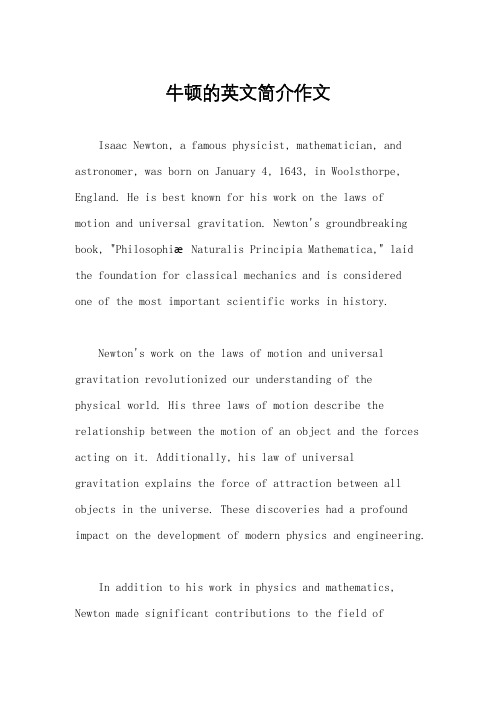
牛顿的英文简介作文Isaac Newton, a famous physicist, mathematician, and astronomer, was born on January 4, 1643, in Woolsthorpe, England. He is best known for his work on the laws ofmotion and universal gravitation. Newton's groundbreaking book, "Philosophiæ Naturalis Principia Mathematica," laid the foundation for classical mechanics and is consideredone of the most important scientific works in history.Newton's work on the laws of motion and universal gravitation revolutionized our understanding of thephysical world. His three laws of motion describe the relationship between the motion of an object and the forces acting on it. Additionally, his law of universalgravitation explains the force of attraction between all objects in the universe. These discoveries had a profound impact on the development of modern physics and engineering.In addition to his work in physics and mathematics, Newton made significant contributions to the field ofoptics. He conducted experiments with prisms and discovered that white light is composed of a spectrum of colors. This led to the development of the first reflecting telescope, known as the Newtonian telescope, which is still used in astronomy today.Newton's achievements earned him numerous accolades and honors during his lifetime. He was knighted by Queen Annein 1705 and served as the president of the Royal Society, a prestigious scientific organization in England. His legacy continues to inspire scientists and scholars around the world, and his work remains a cornerstone of modern physics and mathematics.Despite his immense contributions to science, Newton was also known for his reclusive and eccentric personality. He was deeply interested in alchemy and spent a significant amount of time studying and experimenting with it. Additionally, he had a contentious relationship with other scientists of his time, often engaging in heated disputes and rivalries.Newton's impact on the world of science is immeasurable, and his work continues to shape our understanding of the universe. His legacy serves as a testament to the power of curiosity, perseverance, and ingenuity in the pursuit of knowledge.。
